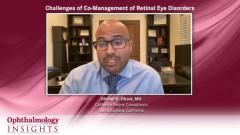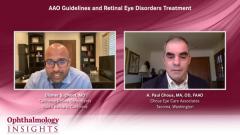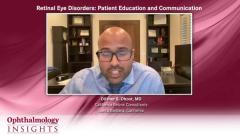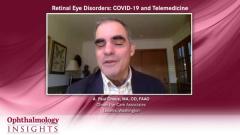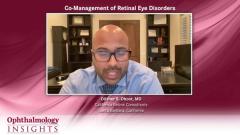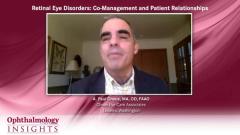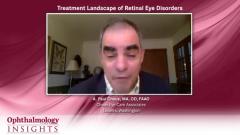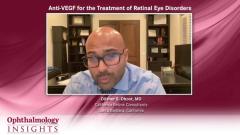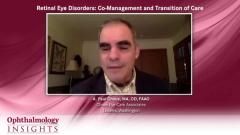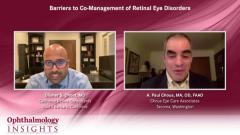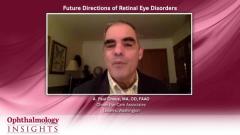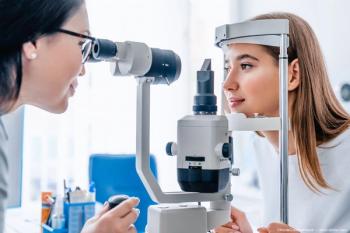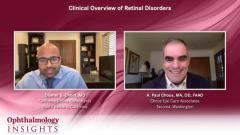
Challenges of Co-Management of Retinal Eye Disorders
Experts discuss the challenges regarding the treatment of retinal disorders, and how co-management can potentially address those challenges.
Episodes in this series

Dilsher S. Dhoot, MD: Moving on here, we have some other questions. What are the challenges regarding the treatment of retinal disorders, and how can collaboration or comanagement potentially address those challenges? What do you think, Paul?
A. Paul Chous, MA, OD, FAAO: It’s a really important topic, right? What I worry about when I make a referral to a retina specialist is, No. 1, does the patient keep the appointment? There are multiple surveys out there that say that about 30% of patients referred on to retina don’t keep their initial appointment. We know that loss to follow-up, particularly in diabetes, which is my wheelhouse, is pretty high; 25% to 50% of patients being treated for diabetic macular edema or even proliferative diabetic retinopathy are lost to follow-up within the first year. I think optometrists can help by encouraging patients to show up to the initial appointment, following up with them to hear their perspective and rapport with the ophthalmologist. I’m a big fan of making an appointment for my patient back with me after the retina consult because I want to ascertain whether they kept the appointment with the retina specialist or not, I also want them to understand the importance of on-going follow-up and any recommended treatment. I think I can be helpful in making sure patients come in to see you when they really need to do so.
Dilsher S. Dhoot, MD: I totally agree with you, Paul. I’ve noticed that there are a number of retinal disorders where the disease can be stewing and brewing, but the patient’s vision is actually still OK. You can take diabetic retinopathy as a prime example. In proliferative diabetic retinopathy, a patient can have large fronds of neovascularization evident on examination, yet their central vision is 20/20, and they’re a ticking time bomb. A lot of times they may be in denial that they have such serious eye issues, and it takes a vitreous hemorrhage to convince them of such. But I think that having a good relationship with optometrists and having education first and foremost with these patients can help emphasize to them that they need to be seen.
I think you’re right with the contact points, every time you see these patients stressing how important it is that they follow up and stick with the game plan. That’s been a big challenge, you’re exactly right, adherence; we used to say compliance, but now we say adherence, to the treatment plan. We see challenges as far as insurance. I don’t know how your population is up there, but unfortunately, there’s still in 2022 a number of patients who are underinsured or uninsured. We definitely have challenges in terms of that, and it can be challenging for optometrists to figure out where to send these patients. If you don’t have a county close by that will accept underinsured or noninsured patients, how do you get access to care? And so, in private practice we do our best to allow for payments and try to make things palatable for patients. Sometimes we’re able to get patients into clinical trials that are very good, but there are challenges with access too, I think.
A. Paul Chous, MA, OD, FAAO: Totally. There are a bunch of barriers, and it’s interesting, what’s been shown to be linked to nonattendance to follow-up exams or the initial referral is low socioeconomic status, lower educational level, and patients who already have complications. In diabetes specifically, if patients already have kidney disease or they’ve lost a foot or even a toe to diabetic neuropathy and foot disease, these patients are far less likely to follow up. What I try to tell my patients is my own personal experience—a retina specialist saved me. I had no symptoms whatsoever. This is 40 years ago now, proliferative retinopathy, and I saw a retina specialist. I had no insurance, and he let me pay him $50 a month until my panretinal photocoagulation therapy was paid off. I think it’s really important that optometrists, as well as ophthalmologists, be versed in cost management. What can be done to get support from drug companies and even from the retina specialists so that needy patients can get treatment? But there’s huge amounts of health care disparity I see in my patients who come in, and they haven’t had an exam in 5 years. They come in with severe diabetic retinopathy or age-related macular degeneration that could have been addressed much earlier than it is because they just don’t feel like they have the financial wherewithal to see a primary eye care provider, much less a specialist.
Dilsher S. Dhoot, MD: It’s really sad. I’ll often get phone calls from friends who are optometrists, asking me to see a patient. Sometimes these patients have very limited means, and we’ll do our best to try to accommodate that patient. I like clinical trials. There are a number of clinical trials, and sometimes patients think that a clinical trial means that you’re going to be a guinea pig, and that’s not always the case. There are phase IV studies or studies where you have an FDA-approved product, and you’re asking a new clinical question regarding that product. Patients are receiving a branded drug, and they’re receiving above and beyond the standard of care in terms of follow-ups and the treatments that they receive.
If you’re collaborating with a retina center that has a fair amount of clinical trials going on, that is an option, too, for patients who are underinsured. Beyond that, I think having a setup as you mentioned, is important. Another point that may come up later, but I think it’s good to bring up now regarding these challenges, is communication between optometry and retina. For us, I think we’ve all been forced to use EMR [electronic medical record systems], but it’s been kind of a blessing in disguise for several reasons. I think one of those reasons is the communication has been made much easier. We can spit out a letter and it’s faxed right away, and can update our optometry colleagues right away. Do you guys look for those letters? Are those letters helpful to you guys?
A. Paul Chous, MA, OD, FAAO: Absolutely. First of all, it lets me know if the patient was seen by the retina specialist. Secondarily, it allows me to give mutually reinforcing, complementary messages to the patient. If I get a letter from retina that says, “This patient needs to see me in 4 weeks,” I can emphasize that to the patient if they’re coming in to ask me questions. “Why do I need treatment? I don’t have any symptoms. What’s going on?” So, communications I think are critical, and having them be bidirectional is really important. In the diabetes space at least, there’s really good evidence that a letter from the family practice doctor is much more effective at getting patients to get dilated retinal exams than are letters from the eye care provider back to the primary care doctor. I’m really trying to encourage our colleagues in primary care, endocrinology, even in cardiovascular care and cardiology, for instance, to send the eye care provider notes so that we’re all on the same page, giving reinforcing messages. I don’t know if that’s something you think is important, but I found it to be a practice builder for me.
Dilsher S. Dhoot, MD: I definitely think it’s nice to get correspondence from the whole medical team. It’s rare that you get a letter from primary care doctors. You might see their notes and there will be a laundry list of problems, and you’ll try to find the eye problem. But optometrists, they’re variable. I’ll get a referral from an optometrist, and it’s always amazing when I have a note. Sometimes it’s just a 2-word diagnosis, and that’s OK, too. We work it out, but it’s nice to see the thoughts the optometrist has, and it can be a variable. There’s some variety in terms of whether an optometrist nails a diagnosis on the first go around, right? It really depends on experience, too, I think, but it’s fine. I think most retina specialists are open to see the patient, whatever they’re labeled as. If it’s correct, great, and if it’s not, there’s never any judgment. I think we try to learn together and just take care of the patient. But you’re exactly right. I think that both ways of correspondence are very important.
A. Paul Chous, MA, OD, FAAO: I try to tell my colleagues, specifically again around diabetes, you’ve got to send a note. It’s incumbent on you to send a note to the primary care provider so that PCPs can meet their HEDIS measures, but especially when we work with secondary or tertiary eye care specialists, we need to let them know why we’re referring the patient. Try to be at least descriptive. I think that telemedicine, that COVID-19 has provoked us now to take images and share those with the retina specialists, even before we make the referral into the retina specialist office. Optometrists fear making a bad referral. The worst thing you can do is not refer a patient who needs treatment, but a lot of ODs [doctors of optometry] are fearful not knowing what the diagnosis is. I think that’s where having a good relationship and having a retina specialist you can talk with, share images with and learn how to be a better referring OD from, is really beneficial.
Dilsher S. Dhoot, MD: I fully agree. A lot of us will go out there and we’ll meet with optometry colleagues and become friends with them, and even if you’re not necessarily friends, you’re just acquaintances or colleagues, we give our cell phone numbers out. I think it’s great to have a cell phone relationship with a retina specialist. You can hit them up whenever you have a question. For the most part, you find that specialist that you jive with, and there should be no judgment, and you can ask questions and text images too. I think that’s a great point.
TRANSCRIPT EDITED FOR CLARITY
Newsletter
Don’t miss out—get Ophthalmology Times updates on the latest clinical advancements and expert interviews, straight to your inbox.


